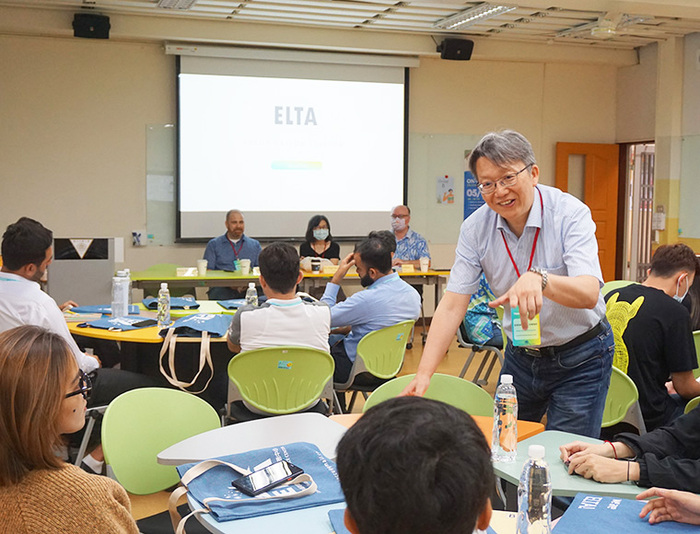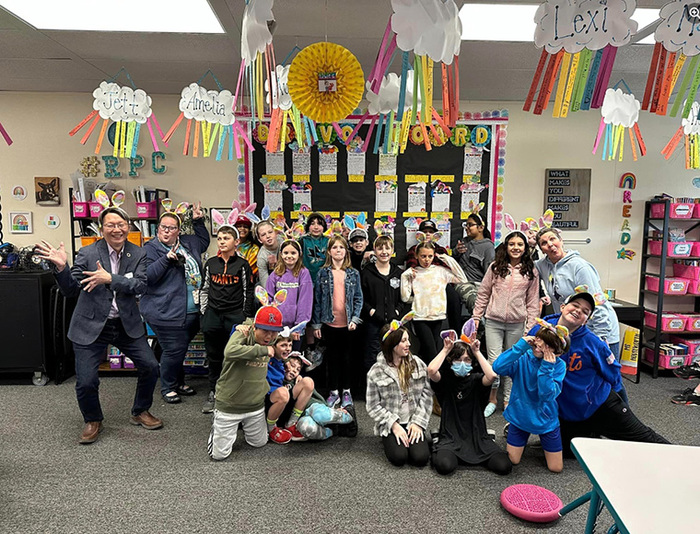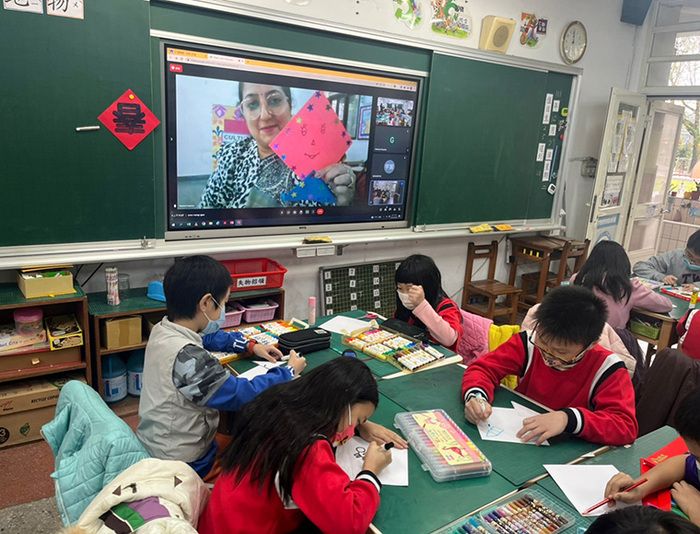The Oversea Sister Schools Alliance Project Runs by CCU Graduate Institute of Education—A Driving Force to Cultivate Students’ English Ability



As English has become the most circulated language in the world, in order to cultivate its people’s English proficiency from an early age, the Taiwan Government has launched the Bilingual 2030 policy by working with different organizations, striving to gear to international standards. The Graduate Institute of Education, National Chung Cheng University (CCU), the academic institute that has been dedicated to international education for more than ten years, is one of these organizations. In the past three years, CCU Graduate Institute of Education has been entrusted by the Ministry of Education (MOE) to be responsible for the execution of the Oversea Sister Schools Alliance Project. Particularly targeting public primary and junior high schools, the project starts with cultural exchange activities and then paves to online cooperative teaching programs to establish international connections between teachers and students from schools of different English-speaking countries involved. The Government expects that through such arrangements, Taiwanese students can have a better understanding of the real-life and culture in various foreign countries, thus further enhancing their interest in English learning.
English learning is like the water sprinkled on the plants, whenever the water isn’t enough to endure the scorching temperature, it will evaporate quickly just before the water demand for growth is satisfied. According to Dr. Sheng-Yao Cheng, the director and professor of CCU Graduate Institute of Education, most students in Taiwan rarely speak English in their daily lives, let alone use other ways to properly improve their English ability. Therefore, to make changes fundamentally, this program aims to create an immersive English learning environment, by increasing the opportunities for students to use English naturally in the class, to eventually improve their overall language skills. It is hoped that Taiwan will become an English-friendly country by 2030.
"Knowledge is no longer limited to books, instead, it can be obtained from all aspects in life", said Dr. Cheng. Taking the “Teddy Bear Project” which is the program affiliated to the Oversea Sister Schools Alliance Project as an example, it uses a different approach to help students of primary and junior high schools from Taiwan build connections with others from English-speaking countries to generate mutual learning behaviors in response to particular tasks, such as the case between schools from Changhua City in Taiwan and California in the US. In that case, after the sisters-relationship between these schools has been officially established, the schools either in Changhua or California first sent plush toys to each other, toys which included Taiwan black bear toys or other types of fluffy toys representing Taiwanese students as well as the California grizzly bear toys representing American students. The toys were treated as a symbol of friendship to encourage students to generate online reports or communications to their buddy students of counterpart schools on the message board, in English or Chinese. Dr. Cheng further pointed out that through this exercise, not only can Taiwanese students experience language exchange in depth by sharing their living culture; but also can foreign students have the opportunity to learn more about Taiwan, for instance, knowing the Taiwanese black bear as the endemic species of Taiwan by receiving the toys sent this time.
Serving as the principal investigator of the three projects, the Empowerment for Teachers and Educational Administrators of the International Education 2.0 (IE 2.0) Policy in Taiwan, the South Center Project of Foreign English Teachers Program (FET Program), and the Oversea Sister Schools Alliance Project for Elementary and Secondary Schools, Dr. Cheng found that for elementary and secondary schools students from western countries, they do not seem to know how to tell the difference between Taiwan and Thailand, not to mention the geographical location of Taiwan. However, he believes that from now on, through the Oversea Sister Schools Alliance Project, students from many English-speaking countries shall be able to know more about Taiwan. For example, in the similar project activity between Keelung Municipal ShangRen Elementary School (基隆市尚仁國小) from Taiwan and Sachdeva Public School from India, through the asynchronous online cultural exchange courses, students in Keelung Municipal ShangRen Elementary School have described some Taiwan customs, such as pasting spring couplets and having reunion dinners with family members during the traditional Lunar New Year holidays to their sister school students in India; while the students in Sachdeva Public School prepared the information on important traditional festivals like the Holi Festival and the Kite Festival (Makar Sankranti) to Taiwanese students in return. More, students from both sides also shared knowledge on how to make paper kites, furthering communication and learning from each other. In this conduct, either party has experienced cultural and linguistic interaction in the class.
Besides applying the online exchange practices mentioned above, in conjunction with the development of the Bilingual Nation 2030 plan, CCU Graduate Institute of Education also helps implement the English Language Teaching Assistant Program (ELTA) for Public Primary and Secondary Schools. In this program, foreign students from countries where English is the official language or the common language, or whose English communication ability meets the level B2 standard under the Common European Framework of Reference for Language (CEFR) can sign up as English language teaching assistants. Since CCU Graduate Institute of Education is in charge of the work across seven counties or cities in the central region of Taiwan, foreign students who are qualified and study in this area will be recruited and assigned to public primary or junior high schools to provide English teaching service occasionally during their school days, by CCU Graduate Institute of Education. Based on the program, each assigned class is bound to have the English-speaking TA give at least one lesson per week, creating a natural and relaxed English-speaking environment for students. Dr. Cheng also said that the Oversea Sister Schools Alliance Project and the ELTA Program, these two programs are complementary and mutually reinforced in order to give students exposure to a more natural English-speaking environment. Other than giving a lesson in the class, English language teaching assistants can sometimes practice English conversation with students casually during lunch breaks, just like taking a club session, thus keeping their learning on class subjects and English communication skills in well balance without taking up the time for normal courses.
The Oversea Sister Schools Alliance Project not only improves primary or junior high school students' overall English proficiency, it can also cultivate teachers' professional skills to meet the potential challenge in advance. For example, according to the CCU Graduate Institute of Education, 25 public primary and junior high schools teachers from California are scheduled to fly to Taiwan for a three-day "International Workshop" this summer, in order to exchange ideas with local teachers on how to cultivate students from both sides as global citizens, the directions and topics for international workshops for cross-border teachers in the future, how to organize the learning practices based on teaching and how to design worksheets to enhance interaction between students in learning from each other, etc. In the future, Taiwanese teachers will also be sent to America through the Oversea Sister Schools Alliance Project to participate in program-related workshop activities to learn from the local education community.

